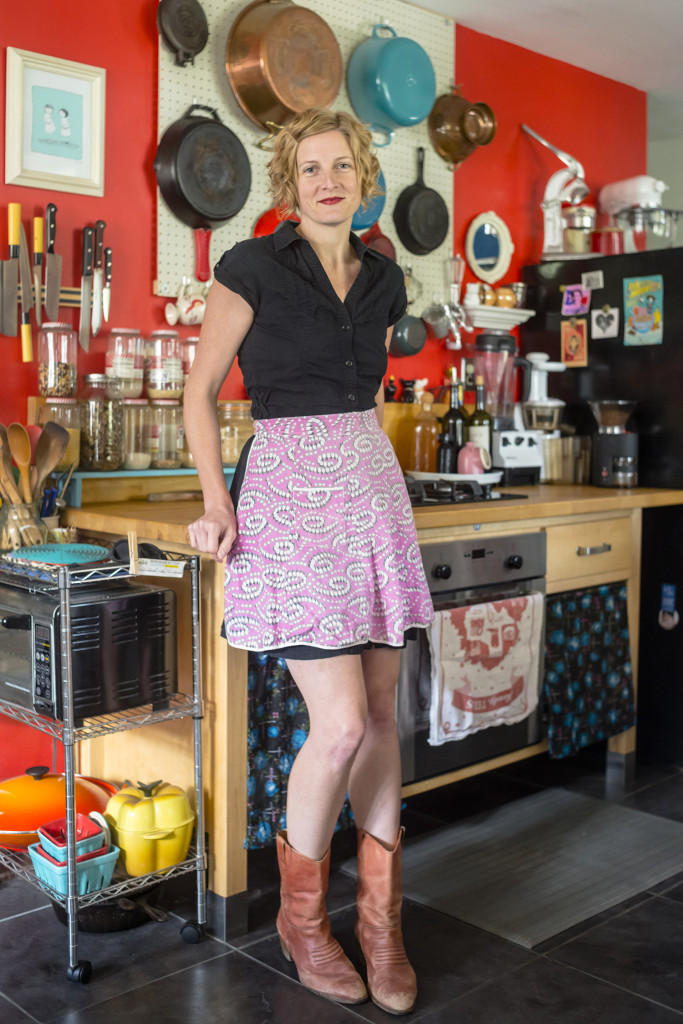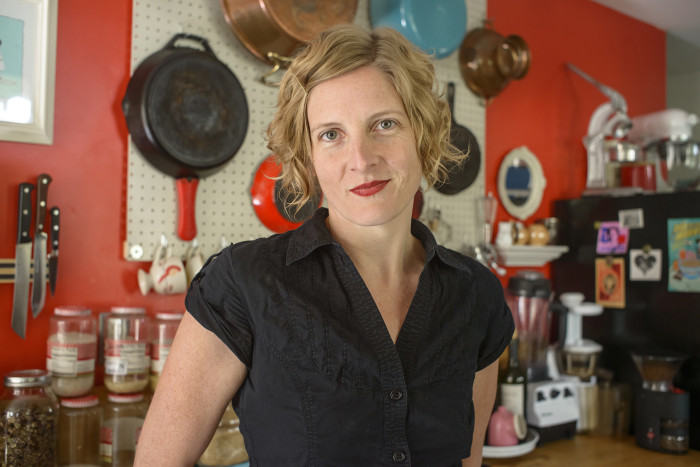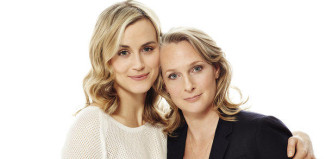They say necessity is the mother of invention, and that was certainly true for Kate Payne. The Austin-based author, educator, and canning aficionado is no Martha Stewart, and we mean that in the best way. Payne’s own experience living on a freelancer’s budget in a pricey city propelled her to a new way of approaching groceries and food preparation. Now she’s sharing that knowledge with readers in her latest book, The Hip Girl’s Guide to the Kitchen, a companion to Payne’s first book, The Hip Girl’s Guide to Homemaking. Payne and her wife, photographer Jo Ann Santangelo, recently moved back to Austin from Brooklyn. We sat down to talk with Payne about her book, kitchen creations, and her favorite Austin spots.
When did you make the Brooklyn-to-Austin transition?
I actually moved with my wife from Austin to Brooklyn in 2008. At that point I’d been in Austin for five years. We moved to New York for her to go to school at the International Center for Photography. Then we moved back here in December 2010. She was born and raised in Boston — she’s a true Yankee — which is why we weren’t moving out there to stay. She didn’t want to live on the East Coast anymore. The cold and the snow was what finally did me in, too. It’s hard when it’s cold and snowy in April, and you’re seeing pictures of your friends at Barton Springs!
Are you a Texan?
I’m from all over the place: a non-military, military kid. My parents were in the restaurant business. I went to four different high schools.
What initially drew you to cooking, canning, and some of the DIY skills you’ve written about in both books?
Being broke in New York and building a freelance career, but also curiosity and missing the types of things I used to buy. So it was “how hard can this be, this jam or pickle thing…?” What finally got me into understanding how to use the groceries we buy was being poor in New York City. We couldn’t afford to not use the groceries we bought. I really enjoy food preservation and creative, fun ways to make stuff.
Once you got into DIY projects and preserving, did it build momentum?
With canning, it becomes a bit of a craze and obsession, in one’s first year. Maybe into two years. You end up with a pantry full of stuff, then the next year you’re like, “Oh, I didn’t eat these things.” It’s about making it work for you and your actual consumption. There was a point in New York where we were getting produce from a CSA share, and my wife asked, “So, do you think you could save some of the things we get to eat fresh?”
What’s been your biggest DIY Eureka moment? Or, conversely, the biggest “whoops”?
I would say that truly understanding how to manage pantry staples, and from there understand what we needed from the grocery store was a really big thing for me. I’d been wasting groceries though my twenties, and it really inspired me to see how you can have a functioning system, where things roll. I’ve had plenty of disasters. In my early fermentation time, I didn’t realize that brine — I was fermenting cucumbers in my pantry – would grow as it sucked water out of the vegetables, so I essentially pickled my pantry, and it happened to also be my linen closet. Luckily the linens were in a plastic bag.

Photography by Jo Ann Santangelo
What’s your favorite culinary find in Austin?
We live close to Salt & Time, I find them to be a great resource. Dai Due too. We get great meats. We find things that can go from the monthly budget to make that work. I really like getting bones from them, and making stocks. We have two bins in our freezer, one for chicken bones, one for all other bones, so I make beef and chicken stock. I also love Third Coast coffee.
As a former East Coaster myself, I have to ask: What do you miss most about living in the Northeast? What’s been the biggest surprise about living in Austin (or Texas)?
Public transit! It makes it easy to have so many options. Although it is nice to be able to drive 30 pounds of fruit home, and not HAVE to take transit, like I did in New York.
Do you and your wife ever collaborate on projects?
We do. She shoots my Edible Austin column, she shot and produced my book trailer, and when we first met, we did a series together where I wrote poems to accompany 12 of her [construction] crane shots. That was in 2008, and it was called “The Arms of Progress.” That was our first artistic collaboration, and we keep threatening to do more things like that.
How did you two meet?
We met through mutual friends at an art opening, above Wally Workman Gallery. There was a Human Rights Campaign art event which I’d tried my hardest not to attend, as did she, so it was a funny thing.
What do you most hope readers learn from The Hip Girl’s Guide to the Kitchen?
I hope people take away the ability to plan simple meals that taste good and work for them. We’ve learned how to save so much money, and we rarely go out to eat. The ability to know how to cook for yourself, as simply or elaborately as you choose, is a good thing. And knowing it’s OK not to love it. That’s something I want readers to know — you don’t have to love this to do it. Often people writing to an audience interested in a DIY book assume everyone’s gung ho and sold on it. I’d like to convince the people who are on the fence but don’t feel they have enough time, energy, money, or whatever they feel is prohibiting them — I’d like to help them change their mind.
I personally don’t love day-to-day cooking. Thankfully that’s something that Jo Ann does, and enjoys doing. She’s about to be gone for a month, and I will continue to feed myself the way we eat. I just probably won’t take on side projects.
What kind of side projects do you like to do?
Usually some kind of vegetable fermenting. And we consume bread about every five days, then I make a new loaf. I’ve always got some sort of vinegar fermenting and also some sort of alcohol infusion. Currently I have cherry pits soaking in Everclear to make an amaretto. Jo Ann has kombucha, that’s her job.
What are some of your personal favorite recipes from the book?
My absolute favorite is my great-grandma’s bacon cabbage slaw. I grew up hating the smell of it — because who likes cabbage? — but in my late teenage years something clicked, and I was like “I love this!”
Another favorite is making jam with any amount of fruit you have, using a methodology for working with what you have, versus “here’s a recipe, make eight pints of this.” Just taking whatever your bounty may be and transforming it into something delicious that you might purchase in a one jar quantity.
There’s been an uptick of interest lately in growing our own food, paying closer attention to what is in our food, and getting away from processed foods. Do you think that interest will translate into larger trends, such as better health or even a change in agribusiness?
I certainly hope so. People are aware that BPA and plastic are bad for us, and maybe we shouldn’t have them. I think awareness of issues like that will translate into [changes in] mainstream consumer products. People are starting to understand what’s bad for us and how we should do things that are better for our health or our bottom lines. The economy’s doing better, but people don’t just forget the experiences of being self-reliant, which saves money and in many cases are good practices to wrap into life.
What else is on the horizon for you?
I’m wrapping up teaching a Whole Foods series. They call it homesteading, but I like to say food preservation, because I’m not teaching people to keep bees and chickens! But coming up, I’m teaching more classes. I’ll be working with Texas Farmers Market, at Mueller and in Cedar Park. I will also teach at El Cosmico in Marfa at the Trans Pecos Music Festival and at Mockingbird Domestics this fall and spring. I’m working on my next book proposal, too. It’s not finished so I can’t say what it is, but it won’t be a Hip Girl’s guide. It will be a similarly friendly, non-fiction book on a particular subject. And, we’re actually going to be working on having a kid, and I will eventually write about that.
Interview by Kate Harrington





































